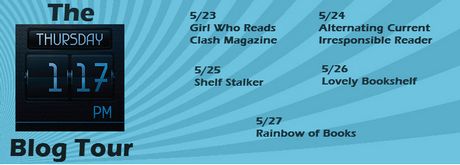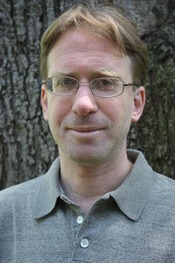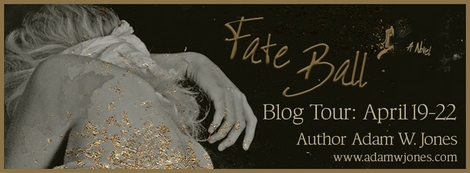
For our third post on this Blog Tour stop, the author of Thursday, 1:17 PM, Michael Landweber was gracious enough to A some of my Q’s. As is typical, I kept it short and sweet, because this dude is busy and he doesn’t need to take up too much time with lil’ ol’ me. There are two questions here about the book we’re focusing on, and then we move on to more general questions. Hope you enjoy.
 Michael Landweber lives and writes in Washington, DC. His short stories have appeared in literary magazines such as Gargoyle, Fourteen Hills, Fugue, Barrelhouse and American Literary Review. He is an Associate Editor at Potomac Review and a contributor to Washington Independent Review of Books. Michael has a soft spot for movies about talking animals and does not believe he would survive the zombie apocalypse. His first novel We was published in 2013.
Michael Landweber lives and writes in Washington, DC. His short stories have appeared in literary magazines such as Gargoyle, Fourteen Hills, Fugue, Barrelhouse and American Literary Review. He is an Associate Editor at Potomac Review and a contributor to Washington Independent Review of Books. Michael has a soft spot for movies about talking animals and does not believe he would survive the zombie apocalypse. His first novel We was published in 2013.
| There are so many questions that I’d like to ask about some of the details of this book, but I’m going to have to settle for something about the process: did you have the rules for the Frozen World set up before beginning the book, or was that something you felt out along the way? |
|
The rules were pretty simple and set from the beginning. Nothing moved unless it was affected by Duck. He would be the only force in the universe capable of changing anything. Otherwise, everything remained in exactly the state it was in when the world froze. Simple, right? Making up the rules was easy; following them was hard. There were many times while I writing when I would decide to do something and realize it didn’t fit in with this world. For example, in an early draft, I thought about shooting someone with a gun. But in order to fire, a gun required more than just Duck power. Similarly, I found myself realizing that he couldn’t cook anything; he could only eat food that was edible at the time the world froze. He couldn’t start a car, but he could ride a bike. So it was never a question of changing the rules. It was a constant struggle forcing myself to not cheat. Hopefully, I policed myself reasonably well. One of the reasons that I had Duck write a guidebook was because it was a great way to share everything about the frozen world I had spent so much time figuring out. That’s why you’ve got multiple pages about how to flush a toilet (and of course because I find details like that amusing). |
|
| How hard was it to get into the headspace of an almost 18 year-old (even one of above-average intelligence/thoughtfulness)? Once there — was it as much fun as it seemed? |
|
It is always a challenge to get into a new character’s head. Or maybe the challenge is getting out of your own head. With a teenager, I did have the advantage that I was once 17 years old. However, it is true that when you become an adult, you forgot how desperate everything feels at that age. As adults, we learn to repress some emotions. It’s a survival skill. So, to write Duck, I tried to remember what it felt like when every emotion was on the surface and raw. I think that immediacy is what we lose as adults. Once I got in that mindset, it was fun to write Duck. Anytime I started to think that Duck shouldn’t be doing something, I usually put it in the book, figuring if I thought it was a bad idea then a teenager probably wouldn’t. |
|
| What’s the one (or two) book/movie/show in the last 5 years that made you say, “I wish I’d written that.”? |
|
There are so many books and TV shows that I enjoy. I’d love to have written any of them. Of course, the flip side of that is that if I had written them, then I wouldn’t get to experience them the same way. I do surprise myself sometimes when I’m writing, but that’s not the same as the visceral thrill that you can get from watching or reading someone else’s work when the unexpected hits you with a perfectly timed twist. That said, there are two very different works that I wish I could have written. First, The Martian by Andy Weir. I would love to have written something that was so meticulously researched and incredibly readable at the same time. You get to the end of the book thoroughly entertained while somehow convincing yourself that you could now survive on Mars if you had to. Second would be Breaking Bad. The entire series. I admire how strictly it stuck to its vision from the beginning. The writers didn’t seem to care how popular it got. They weren’t trying to make anyone happy. It was unflinching to the very end. |
|
| Is there a genre that you particularly enjoy reading or watching, but could never write? |
|
I could never write a good mystery. I don’t watch or read a lot of them, but I do enjoy them when they are well done. As a reader, I never know who committed the crime. Ever. I’ll always think that it is someone who was innocent. I admire the writers who are able to put that puzzle together and keep me guessing to the last piece. But as a writer, my mysteries would probably be more like a pre-schooler’s giant floor puzzle with only four pieces and no irregular edges. |
|
| I’ve often heard that writers, or artists in general, will forget hundreds of positive reviews but always remember the negative — what’s the worst thing that someone’s said about one of your books, and has it altered your approach to future books? |
|
There was one reader review posted on a website about my first novel that stuck with me. He said that after reading it he had to bleach his brain and encouraged everyone to keep the book away from children. Actually, now that I think about it, maybe that was one of my good reviews. Seriously though, there are always going to be readers who don’t like certain things I write. So far, it hasn’t changed what I decide to write next. |
|
![]()
 Michael Landweber lives and writes in Washington, DC. His short stories have appeared in literary magazines such as Gargoyle, Fourteen Hills, Fugue, Barrelhouse and American Literary Review. He is an Associate Editor at Potomac Review and a contributor to Washington Independent Review of Books. Michael has a soft spot for movies about talking animals and does not believe he would survive the zombie apocalypse. His first novel We was published in 2013.
Michael Landweber lives and writes in Washington, DC. His short stories have appeared in literary magazines such as Gargoyle, Fourteen Hills, Fugue, Barrelhouse and American Literary Review. He is an Associate Editor at Potomac Review and a contributor to Washington Independent Review of Books. Michael has a soft spot for movies about talking animals and does not believe he would survive the zombie apocalypse. His first novel We was published in 2013.

